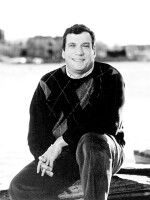RENEE MONTAGNE, host:
Tennis star Roger Federer made history yesterday in New York. He won the U.S. Open Singles Championship, becoming the first man to win five consecutive titles at two different Grand Slam events. His achievement followed Serena Williams' return to the number one world ranking after her victory in the Women's Final. Commentator John Feinstein joins us now. Good morning, John.
JOHN FEINSTEIN: Good morning, Renee.
MONTAGNE: Well, we have to begin with Roger Federer. Can we say he's back?
FEINSTEIN: You know, I'm not sure he was ever that far gone, to be honest. He lost two major finals to Rafael Nadal in the French Open and in that historic Wimbledon final this summer. And people were saying that he was finished at the age of 27. And, of course, that is middle age for a tennis player, but he played better and better as this tournament went on. He was adopted by the New York crowd because he came in as only the number two seed behind Nadal, and as we know, New Yorkers love an underdog. And he played great tennis in the final against Andy Murray yesterday, the young Britain, and never gave him a chance, winning in straight sets.
MONTAGNE: Well, just momentarily, let's talk about Nadal. What happened?
FEINSTEIN: Well, I think he got worn out by his summer, to be honest. I mean, he won the French Open, he won Wimbledon, he won the Olympic gold medal in Beijing a couple of weeks ago. The awful scheduling at the Open, which is the worst scheduled event in sports, put him on court at 11:30 at night for his quarterfinal, and it didn't end until after two o'clock in the morning. And I think he just got worn out. It's not that he played badly, he made the semis, but he didn't quite have the pop he normally has in his legs when he lost to Murray in the semifinals.
MONTAGNE: So, here we are, 13 major titles for Federer, one short of Pete Sampras' all-time record for men. Does he break the title? I mean, does that...
FEINSTEIN: The record?
MONTAGNE: Yeah, the record, rather.
FEINSTEIN: I think he's got a great chance to do it. Again, Nadal is still his major obstacle, just as he is Nadal's major obstacle. I think there's a very good chance in the next couple of years he'll go past Pete Sampras. That doesn't necessarily make him the greatest player of all time because he still hasn't won the French Open on clay, but it certainly gives him a claim to it.
MONTAGNE: And on the women's side, let's talk about Serena Williams.
FEINSTEIN: Yeah. Remarkable story when you realize that two years ago, she was ranked 140th in the world, Renee. She had basically stopped playing. She was more into fashion and travel and didn't train that much. She and her sister Venus had dominated the sport and sort of got bored. And then, when her ranking fell, she got interested again, and lost the Wimbledon final to her sister in July, and came back, beat Venus in the quarterfinals, where they had to play because they only seeded Venus seventh, which is ridiculous, and was really dominant in winning this tournament.
MONTAGNE: Now, with the Williams sisters coming in and out of tennis, do you think if they stay in the game - what would that do for women's tennis?
FEINSTEIN: I think it regenerates interest. I mean they did so much to make the game more popular when they first came on the scene. CBS moved the women's final for the Open to primetime strictly because of them. And they are - they have the potential to be the great rivalry on the women's side - the way Federer and Nadal can be the great rivalry on the men's side - that tennis desperately needs to generate interest in the game again.
MONTAGNE: And just finally, John, talk to us about the passing of Coach Don Haskins.
FEINSTEIN: Don Haskins coached the most important game maybe in the history of sports in 1966 when Texas Western with an all-black starting five beat Kentucky with an all-white starting five. And it wasn't just the symbolism of that game, Renee, that was important. It was the fact that seeing that game opened up recruiting for African-Americans throughout the south and completely changed, literally changed, the face and the color of the sport of basketball. He never wanted credit for it. He just said he was trying to win a game. But he was an extraordinarily important man in the history of sports.
MONTAGNE: John, thanks so much.
FEINSTEIN: Thank you, Renee.
MONTAGNE: The comments of John Feinstein. And this is NPR News. Transcript provided by NPR, Copyright NPR.







